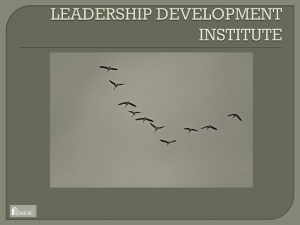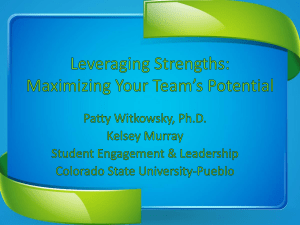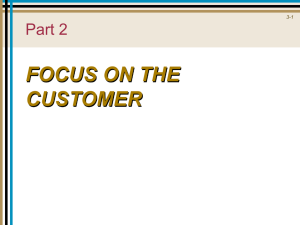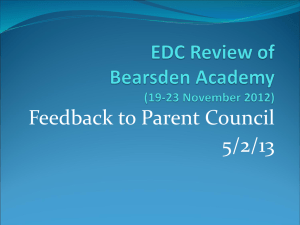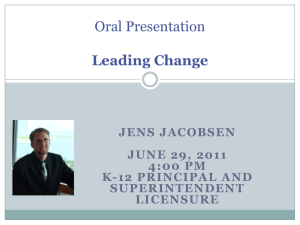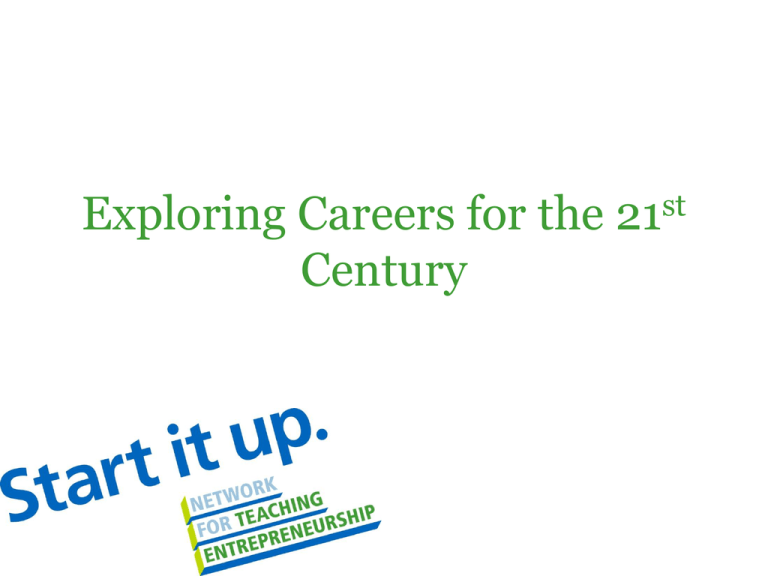
Exploring Careers for the 21st
Century
NFTE Snapshot
•
Mission : NFTE provides entrepreneurship education programs to young people from lowincome communities.
•
Students
–
–
–
•
Target Population: young people from low-income communities, ages 11 – 18
330,000+ youth served since 1987
FY 2011 Goal: 41,000 students
Curriculum
–
Pearson Prentice Hall:
•
•
•
•
–
–
–
•
Your Financial Future, financial literacy lessons and volunteer guide, in partnership with
Bank of America (2nd edition, 2010)
Ten9Eight case study book, in partnership with Scholastic (1st edition, 2010)
Peter G. Peterson Foundation: online personal financial games (1st edition due Q3 2010)
Operations & Financial Information
–
2
Entrepreneurship: Owning Your Future (11th edition, 2009, for high school)
Entrepreneurship: Starting & Operating a Small Business (2nd edition, 2009, for college)
BizTech 3.0: online business plan tool
Exploring Careers, middle school textbook funded by MetLife (1st edition, 2010)
Active programs in 21 states and 11 countries
Why Our Work Matters
• Too many young people drop out of school
today
• With the world economy struggling and US
unemployment hovering around 10%,
entrepreneurs and small businesses are
key to economic growth.
• NFTE improves lives through
entrepreneurship education
3
NFTE: Where it All Began
• Steve Mariotti, Founder
• New York City Public School
System
• Motivation and Entrepreneurship
link
4
"Our program
transforms street
smarts into
business smarts"
5
White House Visit: Obama Meet &
Greet
The 2010 finalists of the National
Youth Entrepreneurship Challenge
and NFTE’s Elevator Pitch
Challenge met with President
Obama in the Oval Office on
Tuesday, October 12, 2010
Winners:
6
1st Place ($10,000): Nia Froome,
Mama Nia’s Vegan Bakery, New York, NY
2nd Place ($5,000): Nina Velic & Belma
Ahmetovic, Beta Bytes, Hartford, CT
3rd Place ($2,500): Crystal Vo,
Sweet Tooth Bites, San Jose, CA
Elevator Pitch Challenge: Steven
Gordon, TatooID, Brooklyn, NY
(l-r) Amy Rosen, NFTE’s President & CEO; Nia Froome, 1st place winner;
Nina Velic and Belma Ahmetovic, 2nd place winners; Crystal Vo, 3rd place
winner; Steven Gordon, Elevator Pitch Challenge winner.
NFTE Student Experience – Reinforcing a Pathway
NFTE Program focus at each stage
N F T E IN THE CLASSROOM / OUR C U R R I C U L U M
Students
learn
business
practices
through
experiential
modules
MIDDLE/EARLY SCHOOL
Students
learn through
in-depth
courses and
learn to
develop a
business plan
EARLY HIGH SCHOOL
NFTE bridges the
middle & high
school experience
through Summer
BizCamps and
online services
Students
develop a
deeper
understanding
through
mentoring &
competition
LATE HIGH SCHOOL
College/
PostSecondary
Curriculum
COLLEGE, OWN A BUSINESS
& BEYOND
NFTE offers
e-Club, an
afterschool
opportunity for
students to
expand their
entrepreneurial
activity
NFTE Alumni Network
www.nftealumninetwork.com
NFTE BEYOND THE CLASSROOM
7
Career Explorations for the 21st Century
Organization
• 5 Parts
• 24 Chapters
• 3-7 Skills Sections
Five Parts/Units of Learning
•
•
•
•
•
Part I: Careers and You
Part II: Preparing for a Career
Part III: Career Development
Part IV: Entrepreneurship
Part V: Financial Management
Magazine style design
End of chapter activities
End of chapter activities
End of chapter activities
Entrepreneurship Workbook
Teachers Wraparound Edition
Teacher’s Wraparound Edition
Teacher’s Wraparound Edition
Teacher’s Wraparound Edition
Exploring Careers for the 21st
Century: Teacher’s Resource CD
• Chapter PPTs
– Key Concepts
– Vocabulary
• Exploring Careers Workbook Answer Key
• Career Plan Template
• Test Generation Software
NFTE Careers Program
Learning Process
Guided
Instruction
Activity
Business
Development
Close the
Learning
Setting the stage
for learning/chapter
reading
Apply the concept
through examples
Relate concepts to
entrepreneurship
Reinforce concept &
connect the learning
to business pitch
22
Learning Objectives
• Identify personal characteristics
• Differentiate between business ideas and
opportunities
• Evaluate and communicate business
opportunities
Content
• 12 Chapters
• 60 hours
Chapter
Content
1
Your Personal Strengths
2
The Roles You Play
3
Why We Work
5
Think Like an Entrepreneur
6
Skills for Success
8
Communicating with
Others
9
Building Relationships
Content
Chapter
Content
10
Basic Math Skills
11
Technology in Your
Career
16
Living a Healthy and
Balanced Life
17
Starting Your Own
Business
18
Planning Your Business
Materials
• Exploring Careers for the 21st Century
student textbook
• Entrepreneurship Workbook
• Ten9Eight Movie & Student Companion
book
Program Standards
12 standard NFTE activities
Online buying & selling event
1 guest speaker
Deliverable
In groups students will create & present
• Commercial (optional)
• 2-minute business pitch
• Expo board with key concepts
Example: Personal Strengths
Recognizing Your Values
Values are the thoughts, ideas, and actions that are important
to you.
• Something has instrumental value if it is important for
acquiring something else.
• Something has intrinsic value if it is important in and
of itself.
• Moral values help you tell right from wrong.
• Work-related values refer to how you like to work and
the results that you produce.
• Values can change as you grow.
• Not everyone values the same things.
30
Understanding Standards
and Ethics
Standards are guidelines for whether or not something meets
expectations. Ethics are a set of beliefs about what is right and what is
wrong.
• Standards are used to measure performance.
• One way to avoid conflict is to have flexible standards that you
can adapt to different situations.
• Your values and standards are also influenced by your ethics.
– Some ethics are established by society.
– Some ethics are established by groups of people,
such as the members of certain professions.
– Some ethics are personal and usually measure
virtues such as honesty, compassion, and
loyalty.
31
Identifying Your Strengths
and Interests
Your strengths are your positive qualities and skills.
• Your personal qualities are the
characteristics and traits that make you
unique.
• A skill is an ability or talent—something
you do well.
• To recognize your own strengths, you
must be very honest about what you do
well, and what you do not.
• Strengths also include accomplishments,
32
Recognizing
Character Qualities
Your character is the personal qualities or traits that make you unique.
• You show your character qualities by the
way you act and the things you say.
• Your character traits influence the way
other people see you and the way you see
yourself.
• You develop character qualities over time
as you come to understand what is
important to you.
• You can also emulate—or copy in a
33
Having a Positive Attitude
• One way to tell a positive character trait from a negative
character trait is to ask yourself whether you would like that
trait in someone else.
• Positive character qualities—or virtues—make you feel
good about yourself and contribute to your well-being.
• Attitude is the way you think, feel, or behave, particularly
when you are with other people.
• When you have a positive attitude, people want to be
around you.
• Most employers want to hire people who have a positive
attitude. You can develop a positive attitude by developing
positive character traits.
1
3
4
Chapter Review
• A career is a chosen field of work in which you try to
advance over time by gaining responsibility and earning
more money.
• A job is any activity that you do in exchange for money or
other payment.
• Occupation is a word that means career or job.
• Career requirements are the responsibilities that you must
perform in order to succeed in the career.
• Values are the thoughts, ideas, and actions that are
important to you.
• Standards are guidelines for whether or not something
meets expectations.
1
3
5
Chapter Review (Continued)
• Ethics are a set of beliefs about
what is right and what is wrong.
• Your strengths are your positive
qualities and skills.
• Your character is the personal
qualities or traits that make you
unique.
• When you have a positive attitude,
people want to be around you.
• Employability means having and
1
Career
3
6
Personal Strengths Activity
• Create Your Own Superhero
– What would your super power be?
– What strengths would you have?
– What would your superhero look like?
– What type of evil would you fight? Why?
– What would your weakness be?
– What would your everyday identity be?
• Draw and Present back
3
7
Personal Strengths Activity Debrief
• What did you think about the activity?
• As a Student?
• As a Teacher?
• What was the purpose/objective?
• How would this work in your classroom?
• Any Modifications?
3
8
Personal Strengths Activity Objective
• Identify and discuss strengths, talents and
interests
• Assess personal strengths, characteristics
and skills
• Reinforce chapter concepts
3
9
Personal Strengths: Business Development
• Name 3 Entrepreneurs
• What characteristics do they have?
• What characteristics do you share with
them?
• Based off your characteristics and skills
brainstorm business ideas
4
0
Supplemental Materials
Your Financial Future
(volunteer curriculum)
Financial Literacy
Digital Games &
Modules
Ten9Eight
Finance
Quest
Financial Literacy Games and Simulations
Generously Supported by the
Peterson Foundation
Financial Literacy Lessons
Teachers and NFTE Volunteers
Unit 1: The Economic Way of
Thinking
Unit 2: Money Management and the
Basics of Banking
Unit 3: Saving and Investing
Unit 4: Spending
Unit 5: Credit
Unit 6: Philanthropy and Giving
Unit 7: Personal Insurance Needs
Unit 8: Career Planning:
Taking Charge of Your Life
How Can You Get Involved?
Visit our website : www.nfte.com
Find a NFTE location near you!



